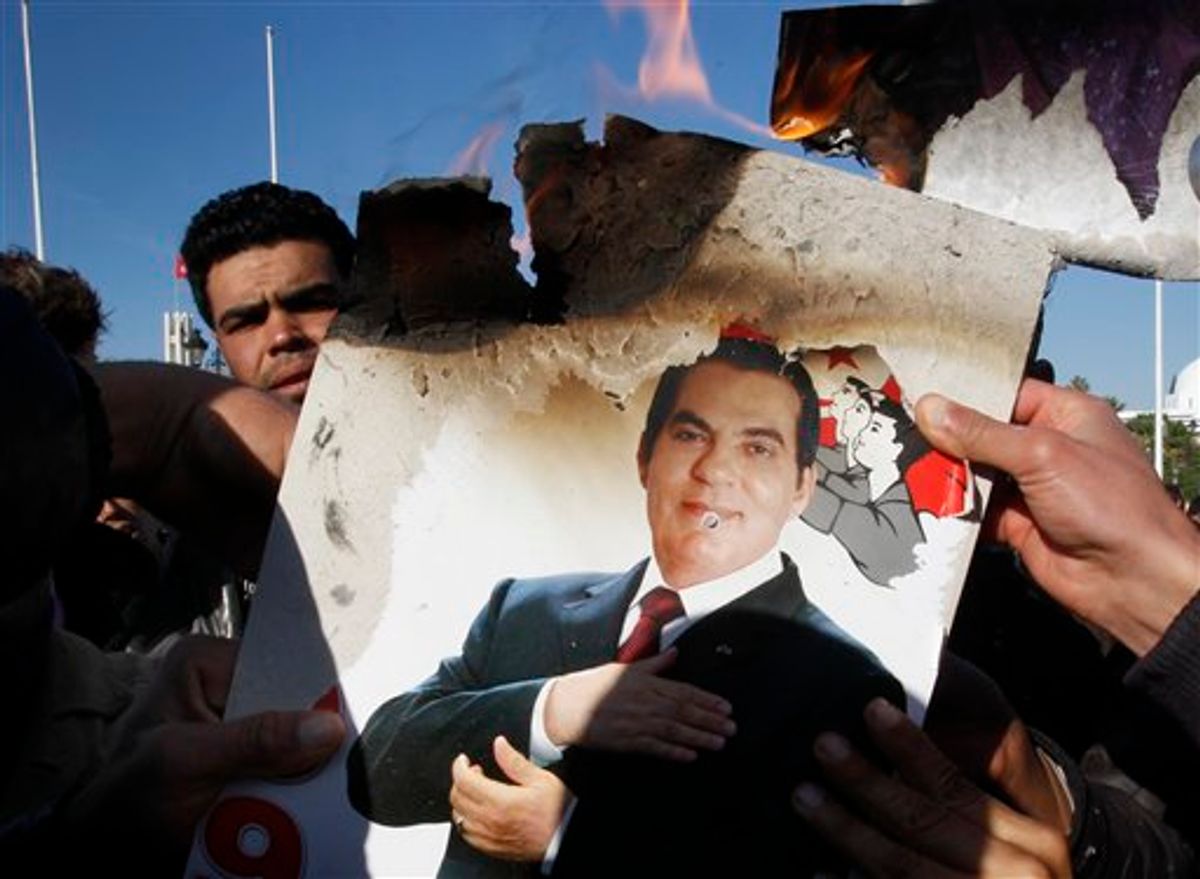Tunisia's former autocratic ruler, whose ouster triggered a series of Arab world uprisings, went on trial in absentia Monday in the first of what will likely be a long series of court proceedings five months after he went into exile.
The Tunis Criminal Court is hearing two embezzlement, money laundering and drug trafficking cases against Zine El Abidine Ben Ali. It follows the discovery of around $27 million in jewels and cash plus drugs and weapons at two palaces outside Tunis after he flew to Saudi Arabia on Jan. 14.
Ben Ali, 74, vigorously denied the charges in a statement through his French lawyer, calling the proceedings a "shameful masquerade of the justice of the victorious."
Five public defenders have been assigned to Ben Ali and his wife, Leila Trabelsi, who is accused in one of the two cases in Monday's trial. Tunisian law prohibits a foreign lawyer from defending a client in absentia, judicial officials said, meaning French lawyer Jean-Yves Le Borgne cannot take part in proceedings.
Saudi Arabia did not respond to an extradition request, and some Tunisians expressed frustration that he would not be present for his judgment. A verdict could come later Monday.
Ben Ali and his wife are charged in the discovery of a trove of valuable jewels and cash in Tunisian and foreign currency at a palace in a village north of Tunis. Images of the cache shown on TV after the discovery shocked Tunisians.
The second case surrounds the seizure of arms and drugs at the official presidential palace in Carthage during a search by a commission investigating abuse of authority formed after Ben Ali's departure. He faces charges of possessing and trafficking drugs, detention of arms and munitions and failing to declare archaeological works also found at the palace.
If convicted, Ben Ali faces five to 20 years in prison for each offense.
More serious charges, including plotting against the security of the state and murder, will be dealt with at future trials. Judicial authorities say that Ben Ali and his entourage are implicated in 93 civil cases and 182 others that fall under military jurisdiction.
In the statement released by Le Borgne, Ben Ali "vigorously denies" accusations against him, saying he never had huge sums of money and claiming most of the weapons found were gifts from visiting heads of state.
"As for the drugs allegedly found, that is a lie and an ignominy ... It is absurd and defamatory," the statement from the lawyer said. The trial has "no goal but to accuse yesterday's president."
"I devoted my life to my country and aspire, at the twilight of my existence, to conserve my honor," Ben Ali said in the statement.
Backed by his powerful party that controlled all sectors, Ben Ali governed with an iron fist, suppressing dissent and quashing all freedom of expression. An official for the Ministry of State Domains, Mohamed Adel Ben Ismail, evaluates the fortune amassed by Ben Ali and the powerful Trabelsi clan of his widely detested wife at a quarter of the value of the Tunisian economy.
In power for 23 years, Ben Ali's regime unraveled with a monthlong uprising around the country triggered by the fatal self-immolation of an unemployed man in the rural heartland. That sparked protests that moved through the countryside to Tunis, the capital, and failed to die down despite concessions from the president. In a surprise move, he left for exile.
Ben Ali denied that he fled Tunisia, saying he left to avoid "fratricidal and deadly confrontations" among Tunisians. The statement said he would clarify the circumstances of his departure at an appropriate time.



Shares